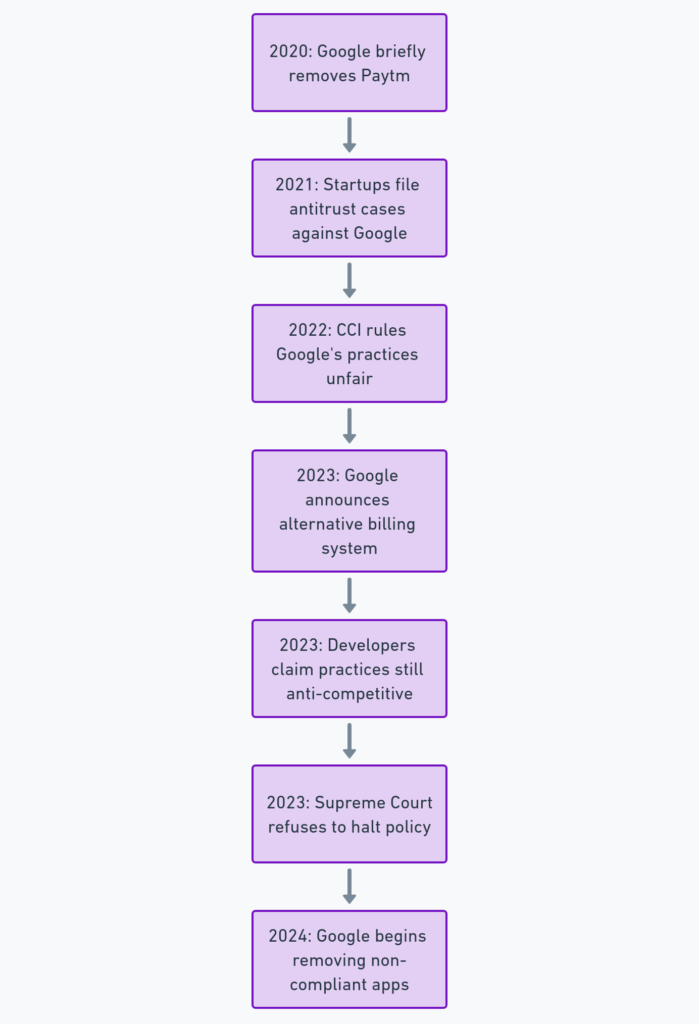Google recently removed over 20 apps from Indian developers for not complying with its Google Play Store payment policy. The apps included prominent names like Bharat Matrimony, Naukri.com, Shaadi.com and others, impacting businesses relying on the Android platform.
Overview of Google’s Payment Policy
Google charges a service fee on certain types of transactions conducted within apps downloaded from the Play Store. This includes:
- In-app purchases: 15-30% fee
- Subscription fees: 15% for first year, 30% afterwards
| Service Fee Type | Service Fee |
|---|---|
| Developers enrolled in the 15% service fee tier | 15% for the first $1M (USD) revenue earned by the developer each year |
| 30% for earnings in excess of $1M (USD) revenue earned by the developer each year | |
| Subscriptions | 15% for automatically renewing subscription products purchased by subscribers |
| Other transactions | 15% or lower for eligible developers who qualify under programs such as the Play Media Experience Program |
The fee aims to cover the costs of operating and investing in the Play Store infrastructure.
Google argues only 3% of Indian developers need to pay this fee. But others counter that it still negatively impacts major apps.
Timeline of Disputes Over Google’s Policy
Google’s payment policy has faced legal challenges in India over the past few years:
| Year | Key Events |
|---|---|
| 2020 | Google briefly removes Paytm for policy violations |
| 2021 | Multiple Indian startups file antitrust cases against Google’s “high fees” of up to 30% |
| 2022 | Competition Commission of India (CCI) rules Google’s practices “unfair” and “discriminatory” |
| 2023 | Google announces alternative billing system to lower its service charge to 4% |
| 2023 | Indian developers say Google’s billing practices still anti-competitive |
| 2023 | Supreme Court refuses to halt enforcement of Google’s policy |
| 2024 | Google begins removing non-compliant apps |

Google Removes 23 Indian Apps, Including Major Names
On March 1st, 2024, Google delisted over 20 Indian apps from the Play Store, including:
- All apps of Matrimony.com (Bharat Matrimony etc)
- Naukri.com, Naukri Recruiter, 99Acres (InfoEdge)
- Shaadi.com (People Interactive)
- ALTT streaming (Balaji Telefilms)
- Video apps aha and Stage
Google cited non-payment of fees as the reason, despite the apps benefitting from the Play Store.
Reactions from Affected Developers
The founders of the removed apps heavily criticized Google’s actions:
- Bharat Matrimony’s CEO said it was a “dark day for Indian internet”
- InfoEdge founder tweeted it was “the new Digital East India Company”
- Shaadi.com founder described Google as having “little regard for Indian laws”
Industry associations like IAMAI also condemned the removals, urging Google to reinstate the apps.
Significant Impact on Businesses and Livelihoods
The app removals threaten major disruption for the affected companies:
- Apps like Bharat Matrimony have over 50 million downloads on Android
- They rely heavily on Play Store for scale as 95% of Indian smartphones run Android
- Switching platforms is difficult due to Android’s dominance
- Smaller developers may even face existential crises
There are also broader economic consequences:
- Google claims Android supports 2.5 million jobs in India
- App store fees hamper domestic firms competing with foreign tech giants
- Indian startups have limited capital access compared to global players
Ongoing Legal Proceedings Against Google
Despite the Supreme Court verdict, there are still pending legal challenges to Google’s practices:
- Antitrust petition in Madras High Court, next hearing in March 2024
- Original CCI order termed Google’s conduct as “discriminatory” and “unfair”
- Petitioners argue Play Store fees are still disproportionately high
So the matter remains sub judice even as Google takes enforcement action.
Calls for Government Intervention and Policy Changes
Google’s dominance in India’s app ecosystem has sparked demands for regulatory action:
- Industry bodies lobby government to develop alternatives like “digital public infrastructure”
- Suggestions include a state-backed app store integrated with UPI and ONDC
- Policy experts argue India needs curbs on “foreign gatekeepers” to foster domestic innovation
So far the government has not announced specific measures, but the incident may accelerate policy reforms.
Impact on India’s App Economy and Market Dynamics
The removal of popular apps signals erosion of developer autonomy in India’s app landscape.
- Showcases Google’s immense leverage due to Play Store’s 95% market share
- Small developers have limited choice but to comply or risk business continuity
- May incentivize adoption of alternative platforms like Indus OS Appstore
However, displacement of Android’s network effects could take years despite regulatory changes.
Conclusion
Google’s crackdown on Indian apps for payment violations underscores its decisive gatekeeper role in India’s app ecosystem. Though the policy enforcement is within Google’s rights, many see it as an abuse of dominance that adversely impacts domestic startups. The incident has brought app store economics into sharp focus, triggering important debates on the need for developer-friendly policies, competitive alternatives and proportionate regulation of app marketplaces. As India envisions self-reliance in its internet economy, addressing the outsized influence of foreign intermediaries will be key. Balancing commercial interests with public good remains an urgent policy challenge.














